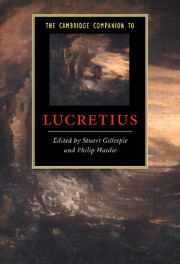Book contents
- Frontmatter
- Introduction
- Part I: Antiquity
- Part II: Themes
- Part III: Reception
- 12 Lucretius in the Middle Ages and early Renaissance: transmission and scholarship
- 13 Lucretius in the Italian Renaissance
- 14 Lucretius in early modern France
- 15 Lucretius in the English Renaissance
- 16 The English voices of Lucretius from Lucy Hutchinson to John Mason Good
- 17 Lucretius in the European Enlightenment
- 18 Lucretius in Romantic and Victorian Britain
- 19 Lucretius and the moderns
- Dateline
- List of works cited
- Index of Main Lucretian Passages Discussed
- General Index
14 - Lucretius in early modern France
from Part III: - Reception
Published online by Cambridge University Press: 28 May 2010
- Frontmatter
- Introduction
- Part I: Antiquity
- Part II: Themes
- Part III: Reception
- 12 Lucretius in the Middle Ages and early Renaissance: transmission and scholarship
- 13 Lucretius in the Italian Renaissance
- 14 Lucretius in early modern France
- 15 Lucretius in the English Renaissance
- 16 The English voices of Lucretius from Lucy Hutchinson to John Mason Good
- 17 Lucretius in the European Enlightenment
- 18 Lucretius in Romantic and Victorian Britain
- 19 Lucretius and the moderns
- Dateline
- List of works cited
- Index of Main Lucretian Passages Discussed
- General Index
Summary
Thanks to a large extent to Montaigne’s interest in Lucretius as well as the strong tradition of rationalism in French philosophy which developed towards the end of the sixteenth century, the role of the author of the DRN in early modern French literature and thought has been generally recognised by scholars, though it has not been explored as fully as it deserves. Fraisse 1962 establishes the main areas of influence but is very often forced to admit that direct allusions to the Roman poet are rarer than might have been expected. Essays and articles have subsequently concentrated in particular on Lucretius’ place in Montaigne’s Essays, where he is the second most frequently cited poet after Horace. However, because of his association with the ideas of Epicurus, Lucretius was throughout the early modern period treated in France with a mixture of admiration and caution. It is no doubt a tribute to his poetic powers that he is to a large extent exempted from the more general climate of hostility towards Epicureanism.
Sixteenth-century French readers of Lucretius tended to view him in one of two ways. On the one hand he could be seen principally as a poet, whose archaising style and rugged hexameters provided a model for the increasingly popular genre of scientific poetry, or whose famous topoi might be taken out of context and used and reused by poets in a range of genres. On the other hand, he was also seen as a philosopher, a mouthpiece for a form of rationalism which would contribute to the rise of libertinism in the early seventeenth century, when Lucretius served as a literary and philosophical source for many of the theories which the libertins embraced.
- Type
- Chapter
- Information
- The Cambridge Companion to Lucretius , pp. 227 - 241Publisher: Cambridge University PressPrint publication year: 2007
- 6
- Cited by



